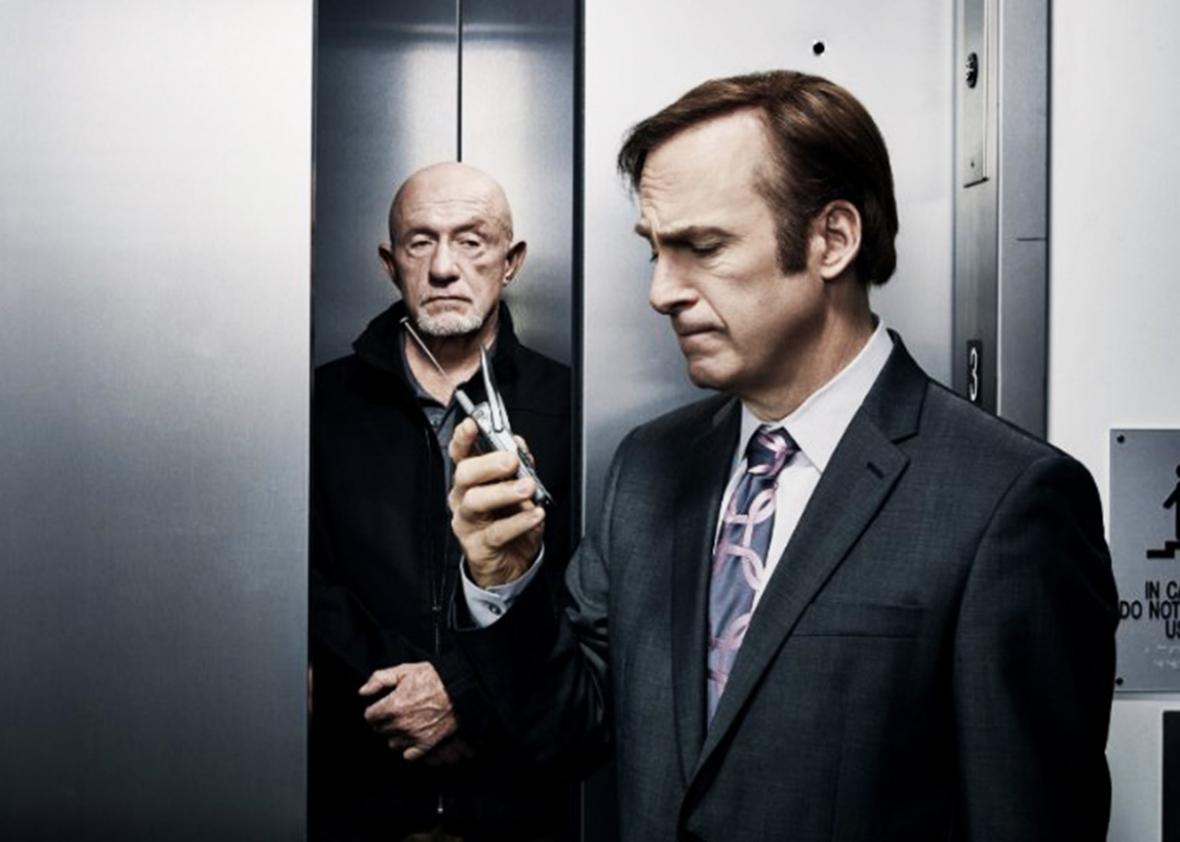Sequels, prequels, spin-offs, reboots—by their very nature, they have something to live up to. Sometimes they surpass what begat them. More often they do not. But only rarely do they aim for, let alone achieve, an entirely distinct mood from their predecessor. Better Call Saul, the spin-off prequel to Breaking Bad (the days of the sequel to the prequel of the spin-off of the reboot are nigh), tells the origin story of sleazy lawyer Saul Goodman (Bob Odenkirk), a regular on Breaking Bad, which told the origin story of chemistry-teacher-turned-drug-lord Walter White. Saul Goodman is a shady huckster, but not a murderous meth peddler—he just profits off murderous meth peddlers—and so Better Call Saul was destined to be a quieter affair than Breaking Bad, which was an ultra-lucid character piece that regularly tried to give its viewers a heart attack.
But quieter and smaller are not terms associated with excitement, or the selling of it anyway. (Perhaps they should be. Please, get me a ticket to an Avengers that is quieter and smaller than the ones before.) When Better Call Saul debuted last year, its first episodes tried to approximate the cliffhangers and the violence that Breaking Bad had conditioned its audience to expect. And yet high-octane action does not make sense for Better Call Saul, a show about a middle-aged man trying to find a way to be satisfied with his life (without diving directly into the drug business). As the first season progressed, it settled into itself and a more organic, plaintive register.
Better Call Saul begins its second season on AMC on Monday night, picking up where the first season left off. That season focused on Saul when he was still going by his given name James “Jimmy” McGill and working hard for little money as a low-level lawyer while tending to the needs of his OCD brother Chuck (Michael McKean), a partner at a white-shoe law firm, rendered housebound by his crippling fear of electro-magnetic radiation. Jimmy was so far from Saul that when he and Mike Ehrmantraut (Jonathan Banks), the phlegmatic fixer who also appeared on Breaking Bad, found themselves in possession of $1 million, they returned it. But Jimmy was doing good because he wanted Chuck’s approval, only to learn that Chuck would never give it. To Chuck, Jimmy would always be beneath him, a ne’er-do-well kid brother with a law degree from a barely accredited law school. Chuck’s good opinion was the reason Jimmy had quashed his inner-con man and now that inner con man was unleashed.
If Better Call Saul is a kind of superhero origin story, the first season ended with Jimmy beginning to embrace his super powers: a flexible sense of morality and a highly persuasive way with the scam. Season 2 finds Jimmy exploring those powers, while starting to develop his secret identity. In order to become Saul, Jimmy will have to cease to care about anyone’s good opinion of him. Chuck betrayed him, but he’s still smitten with the grounded, decent Kim (Rhea Seehorn), a fellow lawyer and more-than-just-friend, who is simultaneously attracted to, and alarmed by, Jimmy’s shady side. She insists that Jimmy start compartmentalizing his life, keeping the fast-talking, rule-bending he does in a lawyerly context away from her.
Out of a lawyerly context is another matter. In a great set piece from the first episode, Jimmy entices Kim to join him in a little scam—fleecing a would-be fleecer out of rounds of expensive drinks. That night Jimmy is showing Kim his skills, his way of reading people, of using his jittery intensity and high-speed manner to let them think they’ve got the drop on him, while he is getting them to do as he pleases. His dilemma is that he does not see a way to use these talents for good, nor does he want to: If you are the most virtuosic bullshit artist in all of New Mexico, doing anything that doesn’t involve at a little bullshitting is too much of a compromise.
Odenkirk is fantastic as Jimmy, both unctuous and charming, slovenly and sexy, able to project pathos and, a rare quality in a human or an actor, fun. He’s the sort of person around whom there is never a dull moment. His show reflects him, just as Breaking Bad reflected the controlled, moody, overpowering Mr. White. Better Call Saul is a good yarn. It is also exactly the sort of show it is hard to imagine getting greenlit on its own merits. It’s great, but its arc—a working stiff who becomes a shadier working stiff, and then, when things get really exciting, the show ends, because the exciting part already happened on another show—is not the sort that sells in the room. If more sequels, prequels, spin-offs etc. used the commercial success of their predecessors to be so searching, so free, they would not be such a consistent insult to new ideas.
